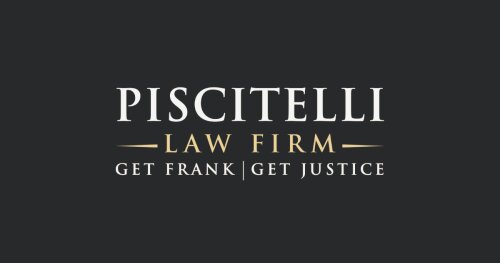Best Toxic Mold Lawyers in Ohio
Share your needs with us, get contacted by law firms.
Free. Takes 2 min.
Or refine your search by selecting a city:
List of the best lawyers in Ohio, United States
About Toxic Mold Law in Ohio, United States
Toxic mold is a serious concern for property owners, renters, landlords, employees, and others throughout Ohio. Exposure to toxic mold, such as black mold (Stachybotrys chartarum), can cause a variety of health issues, especially in children, the elderly, and those with compromised immune systems. In Ohio, toxic mold problems frequently arise in homes, apartments, workplaces, and schools due to water leaks, flooding, or improper building maintenance. Understanding your rights and responsibilities with respect to toxic mold is crucial when addressing health, property, and legal issues that may result.
Why You May Need a Lawyer
Legal complexities regarding toxic mold can be overwhelming. Here are some common situations where you may need to consult a lawyer:
- Tenant-Landlord Disputes: If you are a renter dealing with persistent mold problems and your landlord is unresponsive, a lawyer can help enforce your rights or negotiate remediation.
- Property Damage: Homeowners or property buyers may discover mold after property purchase or after unexpected water damage. Legal help is essential to pursue claims against previous owners, contractors, or insurers.
- Personal Injury: Individuals suffering health issues due to mold exposure may need legal assistance to seek compensation for medical bills, lost wages, and pain and suffering.
- Workplace Safety: Employees exposed to mold at work may require guidance on workers compensation claims or OSHA complaints.
- Insurance Claims: Disputes over coverage for mold remediation and related damages with your insurance company often require legal expertise.
- Disclosure Issues: Buyers or sellers involved in real estate transactions may need guidance regarding proper disclosures and how to handle sales where mold is detected.
Local Laws Overview
While Ohio does not have specific state-wide statutes dedicated solely to toxic mold, several areas of law are relevant within the state:
- Landlord-Tenant Law: Under Ohio Revised Code, landlords must provide habitable premises, which may include addressing mold issues caused by water leaks or structural problems.
- Habitability Requirements: Tenants may be able to withhold rent, terminate leases, or seek court orders if landlords fail to fix mold issues related to negligence in property upkeep.
- Disclosure Responsibilities: Sellers in real estate transactions must disclose known material defects, which could include a known mold issue, during property sales.
- Implied Warranty and Contractual Obligations: Lawsuits can arise regarding construction defects, breaches of contract, or warranties resulting in mold contamination or failure to remediate properly.
- Negligence and Personal Injury Law: Those harmed by toxic mold exposure may pursue claims against responsible parties for failing to prevent or address mold growth.
- Building Codes: Local city or county building codes can apply to mold prevention and remediation, particularly after water damage or flooding.
- Insurance Law: Policy language and exclusions regarding mold coverage differ widely, often resulting in disputes that need legal review.
Frequently Asked Questions
What are the signs of toxic mold in my home or workplace?
Common signs include musty odors, visible mold growth in damp areas, persistent water stains, discoloration on walls or ceilings, and increased allergic reactions or respiratory symptoms among occupants.
Can I break my lease if my rental unit has toxic mold in Ohio?
If your landlord refuses to address dangerous mold conditions that impact habitability, Ohio law may allow you to break your lease or take other legal action. Consult with a lawyer to understand the proper process and documentation required.
Are landlords in Ohio legally required to remediate mold?
While there is no explicit state law mandating mold remediation, landlords must provide safe and habitable living conditions. This includes addressing mold caused by structural defects or water leaks.
Does my insurance policy cover mold damage?
Coverage varies depending on your policy. Many standard homeowners and renters insurance policies exclude mold unless it results from a covered peril, such as a burst pipe. It is important to read your policy and consult an attorney if you encounter resistance on a claim.
Who is responsible for mold in a rented property?
If mold is due to a landlord's neglect (such as failing to repair leaks), the landlord is usually responsible. If caused by a tenant's behavior (such as failing to ventilate bathrooms), tenants may share liability. Each situation is unique.
Can I sue a contractor or builder for mold problems in Ohio?
Yes, if mold growth is caused by poor construction, defective materials, or failure to comply with building codes, legal action may be possible against contractors, builders, or previous property owners.
What health symptoms are associated with toxic mold exposure?
Symptoms may include allergic reactions, asthma, respiratory issues, headaches, sinus infections, skin rashes, and, in extreme cases, neurological effects. Those with pre-existing conditions are especially vulnerable.
How long do I have to file a lawsuit for mold-related issues?
The statute of limitations in Ohio depends on the nature of the claim, such as personal injury or property damage. Time limits typically range from one to four years. Consult a lawyer promptly to preserve your rights.
What should I do if I discover mold in my property?
Document the damage with photos, notify your landlord or property manager, seek medical attention if you experience health symptoms, and consider professional mold testing. Contact a lawyer for advice on your rights and remedies.
Are there government agencies that handle toxic mold complaints in Ohio?
Certain local or county health departments, the Ohio Department of Health, and the Environmental Protection Agency (EPA) may offer guidance or respond to health-related complaints. However, most mold-related disputes are handled in civil court.
Additional Resources
- Ohio Department of Health: Provides educational materials on mold, health effects, and prevention.
- United States Environmental Protection Agency (EPA): Offers guidelines on indoor air quality and mold remediation.
- Local Health Departments: Certain city or county offices may inspect rental properties or address tenant complaints regarding unsafe living conditions, including mold.
- Legal Aid Societies: Organizations such as Ohio Legal Help or local legal aid offices can assist those with limited resources in handling landlord-tenant and habitability disputes involving toxic mold.
- Ohio State Bar Association: Can connect you with attorneys specializing in mold, tenant rights, personal injury, and real estate law.
Next Steps
If you suspect toxic mold is affecting your health, safety, or property in Ohio, take the following actions:
- Document all instances of mold, health issues, correspondence with landlords or contractors, and steps taken to address the problem.
- Contact your local health department for potential inspection or advice.
- Review your lease, insurance policy, or purchase agreement to understand your rights and any relevant clauses.
- Consult a lawyer experienced in toxic mold or real estate law to discuss your options and legal remedies. Early legal intervention can often lead to better outcomes, such as successful remediation or compensation.
- If you have suffered health issues, seek prompt medical attention and retain all documentation regarding diagnoses and treatments.
Acting quickly and seeking qualified legal counsel is key to protecting your home, health, and finances when facing toxic mold issues in Ohio. Do not hesitate to ask questions and pursue your rights under the law.
Lawzana helps you find the best lawyers and law firms in Ohio through a curated and pre-screened list of qualified legal professionals. Our platform offers rankings and detailed profiles of attorneys and law firms, allowing you to compare based on practice areas, including Toxic Mold, experience, and client feedback.
Each profile includes a description of the firm's areas of practice, client reviews, team members and partners, year of establishment, spoken languages, office locations, contact information, social media presence, and any published articles or resources. Most firms on our platform speak English and are experienced in both local and international legal matters.
Get a quote from top-rated law firms in Ohio, United States — quickly, securely, and without unnecessary hassle.
Disclaimer:
The information provided on this page is for general informational purposes only and does not constitute legal advice. While we strive to ensure the accuracy and relevance of the content, legal information may change over time, and interpretations of the law can vary. You should always consult with a qualified legal professional for advice specific to your situation.
We disclaim all liability for actions taken or not taken based on the content of this page. If you believe any information is incorrect or outdated, please contact us, and we will review and update it where appropriate.
Browse toxic mold law firms by city in Ohio
Refine your search by selecting a city.












